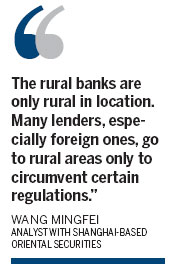Money
Minsheng Bank to open 3 rural banks
By Gao Changxin (China Daily)
Updated: 2011-05-05 09:21
 |
Large Medium Small |
 |
|
China Minsheng Banking Corp Ltd's booth at a finance exhibition in Beijing. The bank has nine rural banking units and two more in the pipeline.?[Photo/China Daily] |
Move is in line with call to improve access to agricultural loans
SHANGHAI - China Minsheng Banking Corp Ltd (CMBC) said on Wednesday it has received the go-ahead from regulators to set up three more rural banking units, continuing a trend among domestic lenders to tap into the country's rural area.
The three units, with a combined registered capital of 400 million yuan ($61.6 million), will be in rural areas in Shanghai, Shandong and Fujian provinces.
Currently, CMBC has nine rural banking units and two more in the pipeline. The three new units will bring the mid-sized lender's total rural banking units to 14.
The move is part of a trend by lenders in China to enter the nation's rural markets, where financial services are largely at a preliminary stage.
SPDB's move comes after HSBC Holdings, Europe's biggest bank, unveiled its 10th rural banking unit in Hunan province in December, making it the foreign bank with the most extensive rural banking network in China.
And the Agricultural Bank of China, one of China's "Big Five" lenders, opened three rural banking units in 2010.
The banks' go-rural trend was partly started by China's banking regulator, which in 2009 announced a plan to set up financial institutions in 1,294 rural locations by the end of 2011 to boost development.
The new institutions will consist of 1,027 township banks, 106 lending firms and 161 rural mutual cooperatives, the China Banking Regulatory Commission said in a statement on its website. 
But as of the end of 2010, China has only 349 rural banking locations, according to data released by the CBRC, leaving plenty of room for lenders to set up operations in rural areas.
However, analysts say most of the current rural banking operations barely provide enough financial services to help agricultural production and rural development.
"The rural banks are only rural in location. Many lenders, especially foreign ones, go to rural areas only to circumvent certain regulations," said Wang Mingfei, a banking industry analyst with Shanghai-based Oriental Securities.
"What they really do is serve locally-based small and medium-sized corporate costumers, and they have little to do with farmers, agriculture or rural development."
Lu Zhengwei, chief economist with Industrial Bank, said for the rural banks to truly get involved in agricultural finance, the government would have to make efforts to reduce the high level of risk involved in agricultural loans.
"The financial infrastructure is lacking in rural areas, where there are no vaults and insufficient transportation facilities, adding risks to the banks' operations," Lu said.
"Meanwhile, people's general credit level and the legal environment in rural areas are worse than in big cities. So agricultural loans there have a better chance of going sour, which is one of the factors deterring the banks."
Agricultural loans extended between 2003 and 2009 have an average default rate of 45 percent, much higher than other types of loans, according to Industrial Bank's Lu.
| 分享按鈕 |



